Hello.
React
Context + Hooks
(and also cool headless SilverStripe things)
Webflow at a glance...
- + visual interface
- + light, mostly read-only database
- + staging environment
fun, no code
- - plans too restrictive or expensive
- - seriously flawed change sets
- - no server code
reasons for moving away
SilverStripe vs. WordPress
- + nice user management + permissions
- + useful change sets
- + data objects + model admins
out the box...
- + top-notch security + dependability
- + first-party support where we need it
- + we're familiar with the modules
Good Business Reasons™
Our setup
Headless
(even by the recently-expanded definition)
NextJS front-end
BitBucket pipelines
(for linting, automated tests, and deployment)
Hosted in AWS
(slightly over-engineered though)
NextJS at a glance...
Great starting point
yarn init -y
yarn add next react react-dom{
"name": "@indiefin/website",
"version": "1.0.0",
"private": true,
"scripts": {
"dev": "next",
"build": "next build",
"start": "next start",
"docker:start": "next start -p 8080 -H 0.0.0.0",
...
},
"dependencies": {
...
},
"devDependencies": {
...
},
"resolutions": {
...
},
"workspaces": [
...
]
}
// package.jsonconst HomePage = () => {
return <div>A new website!</div>
}
export default HomePage
// pages/index.jsThings we're doing in SilverStripe
Menus
(heyday/silverstripe-menumanager)
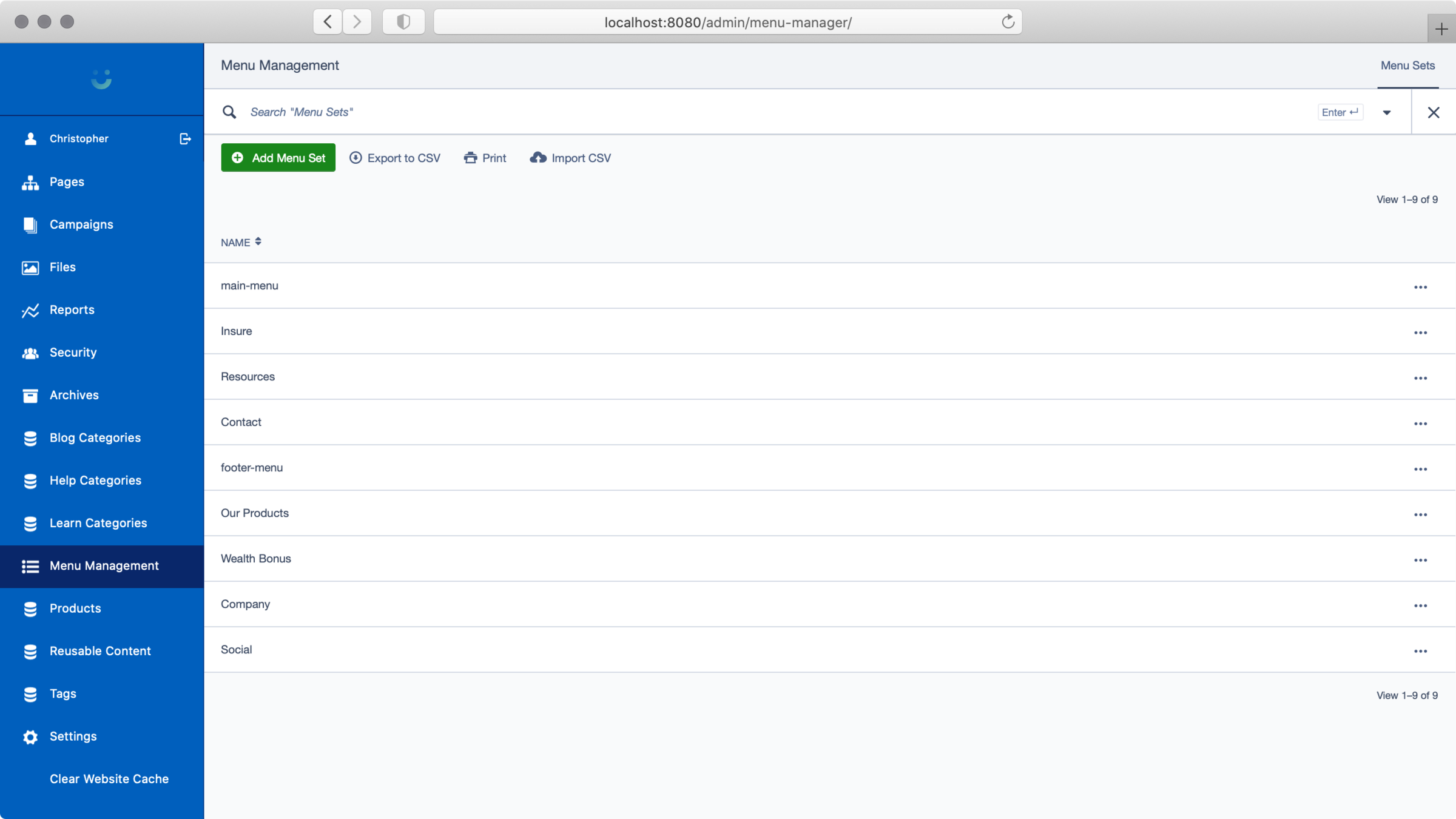

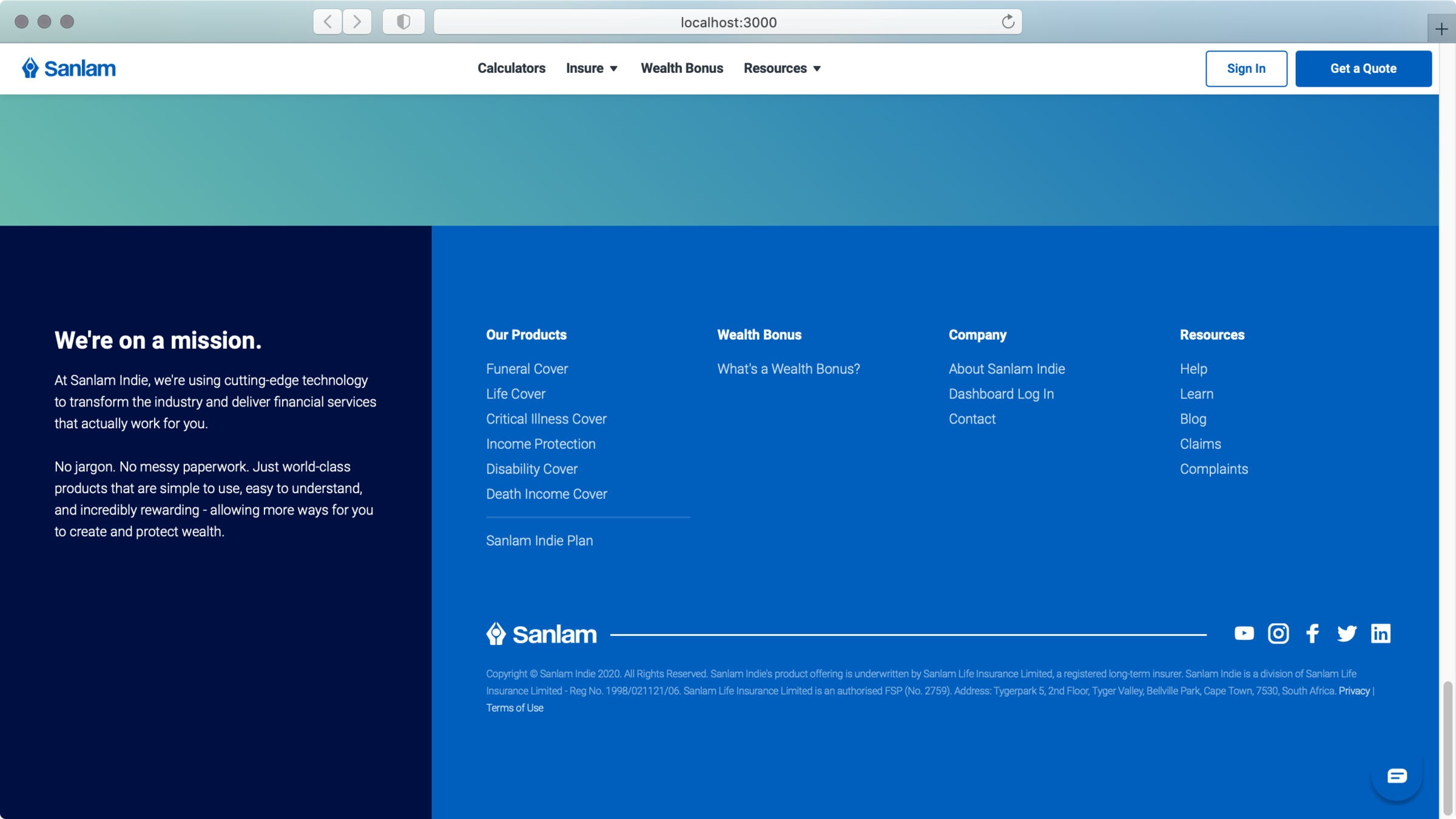
Blog
(silverstripe/blog)
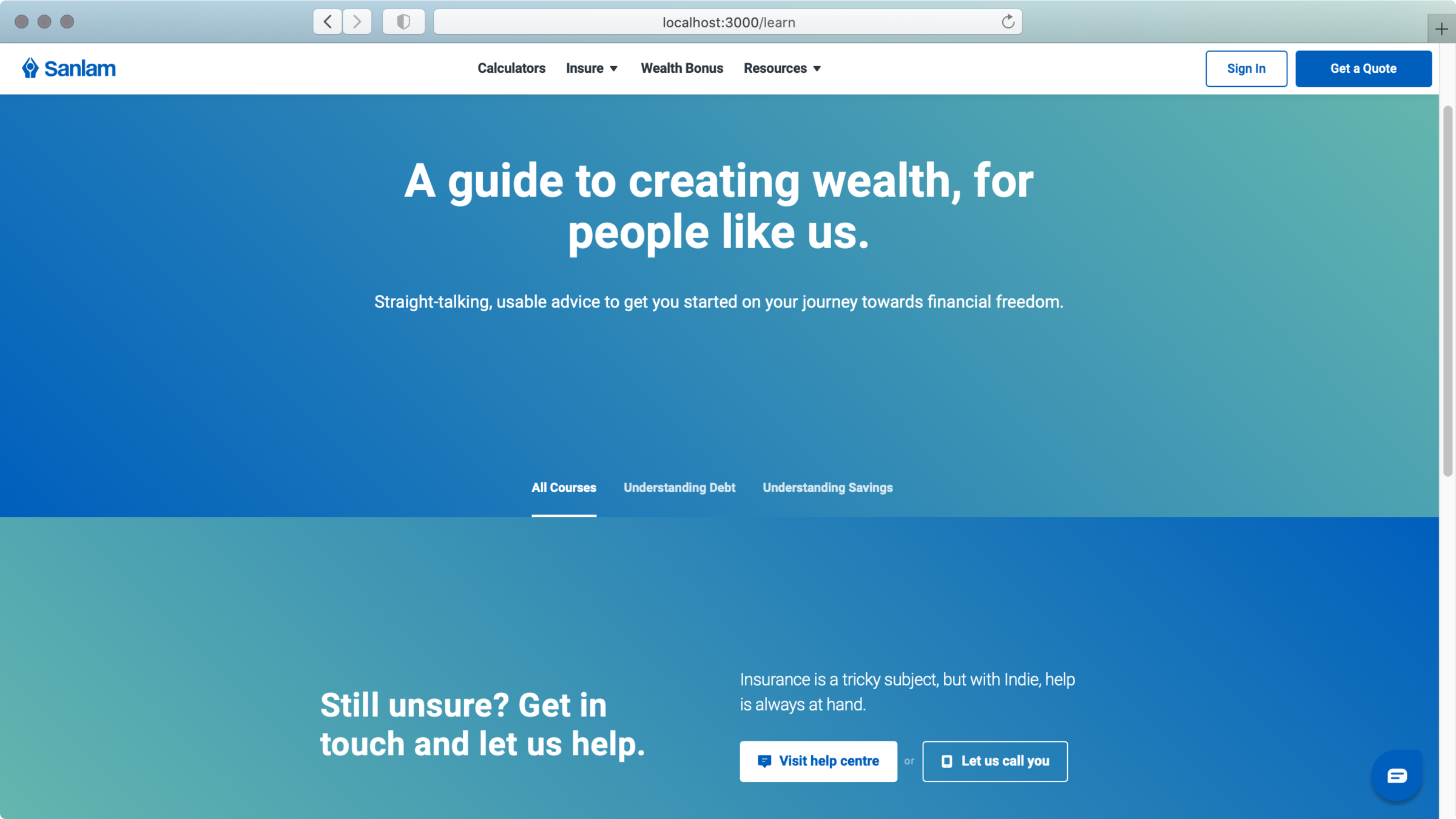
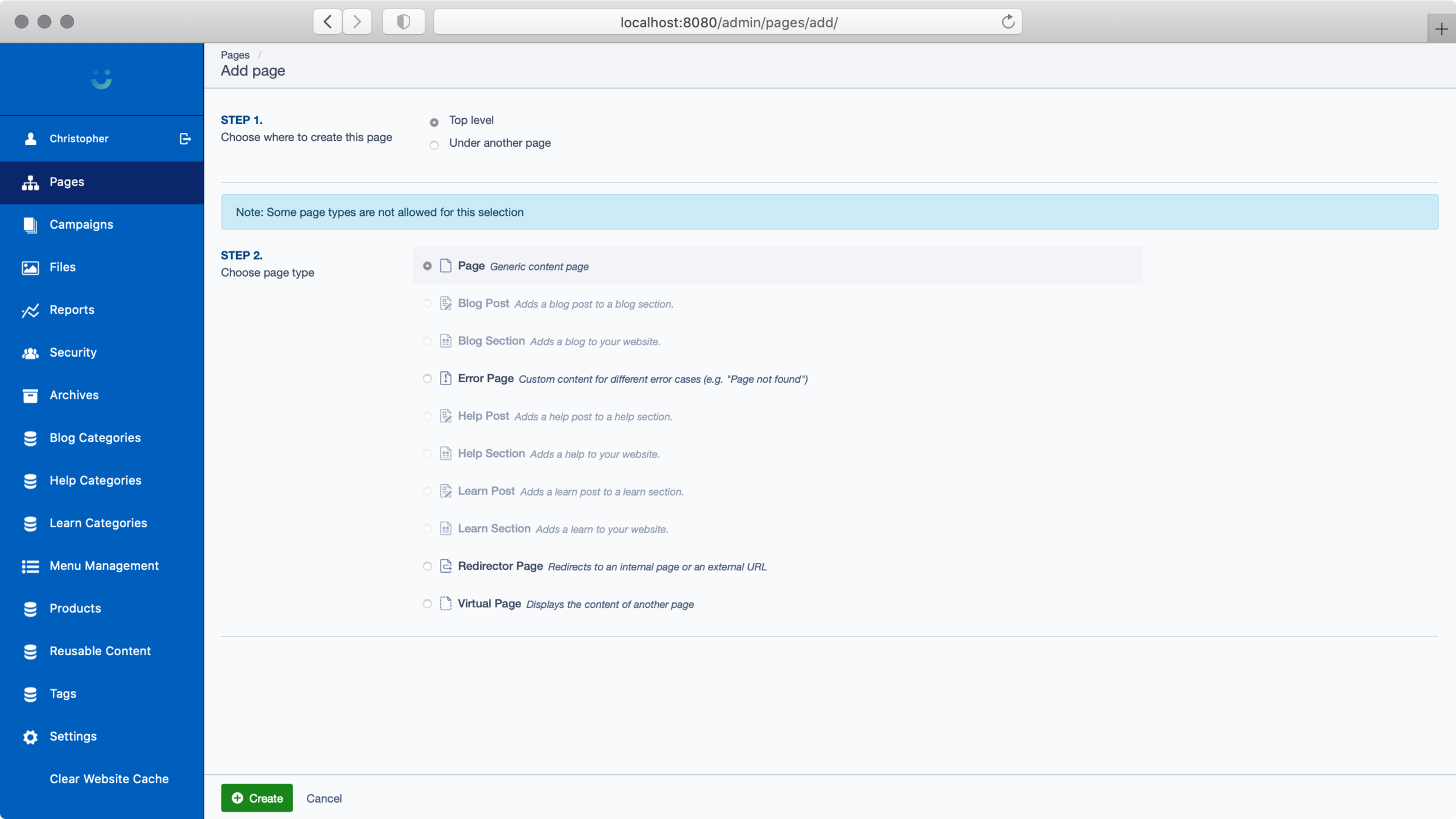
Markdown
(fork of silverstripers/markdown)
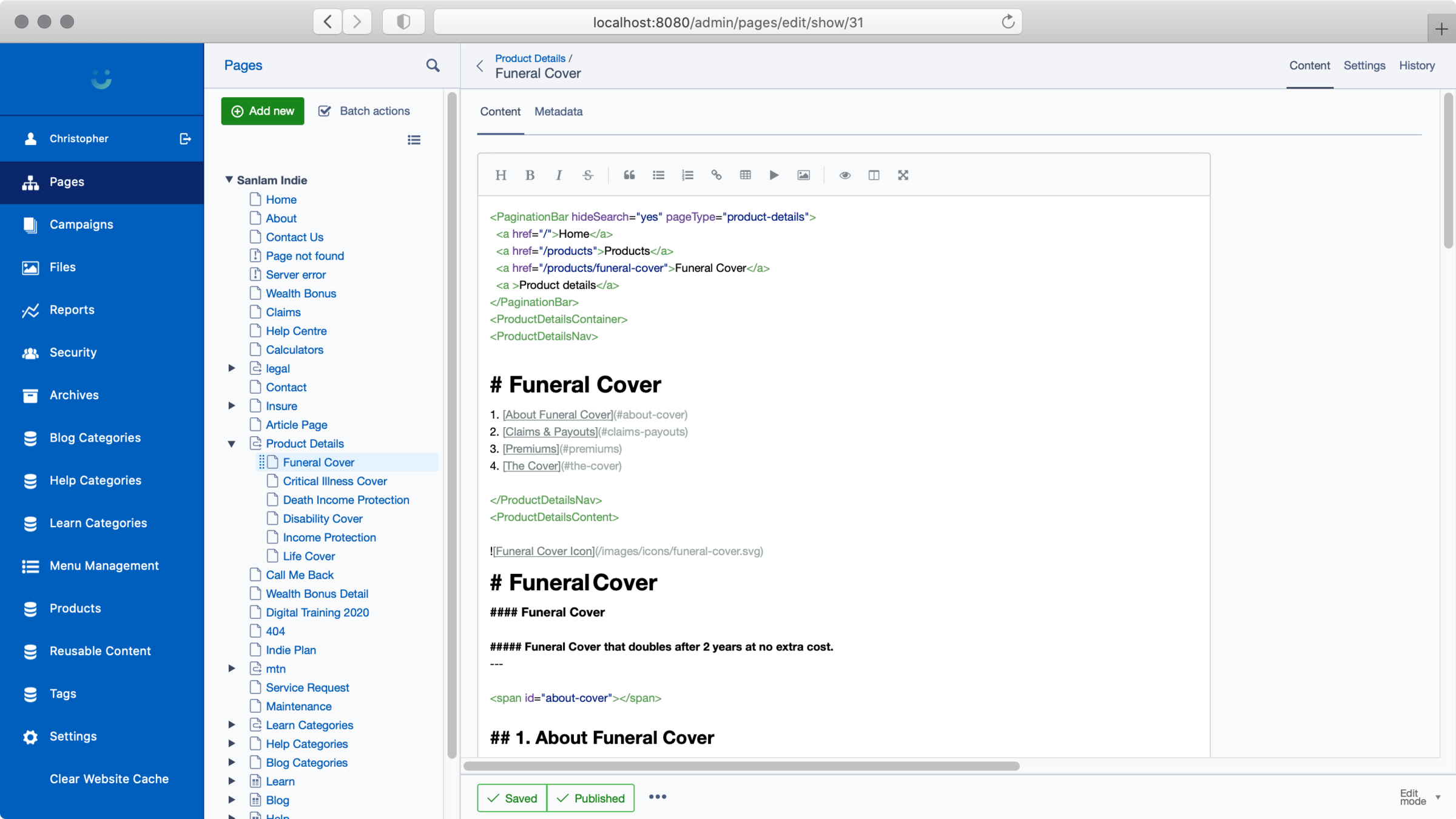
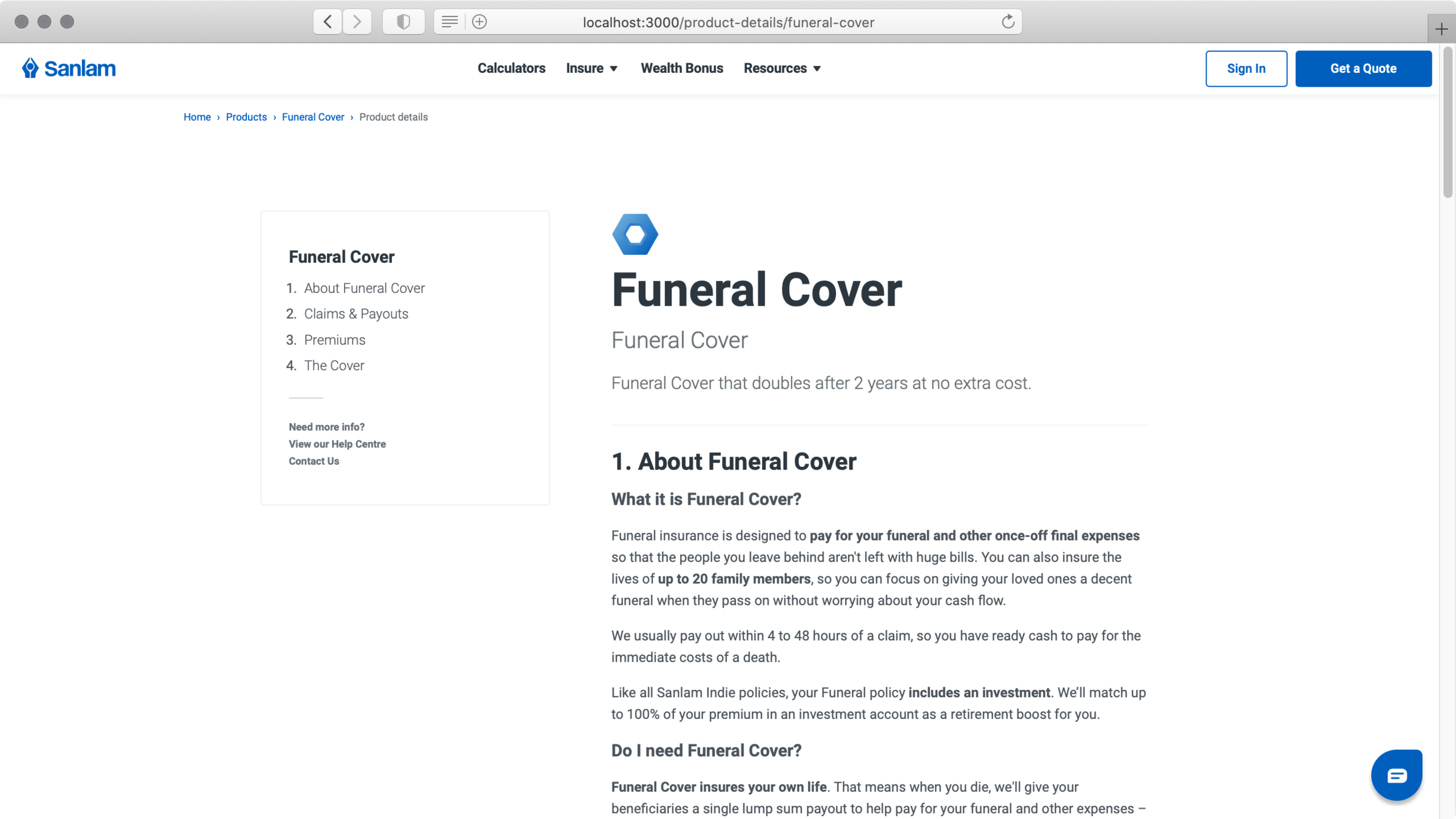
Reusable Content
(that's just like...a data object, man)
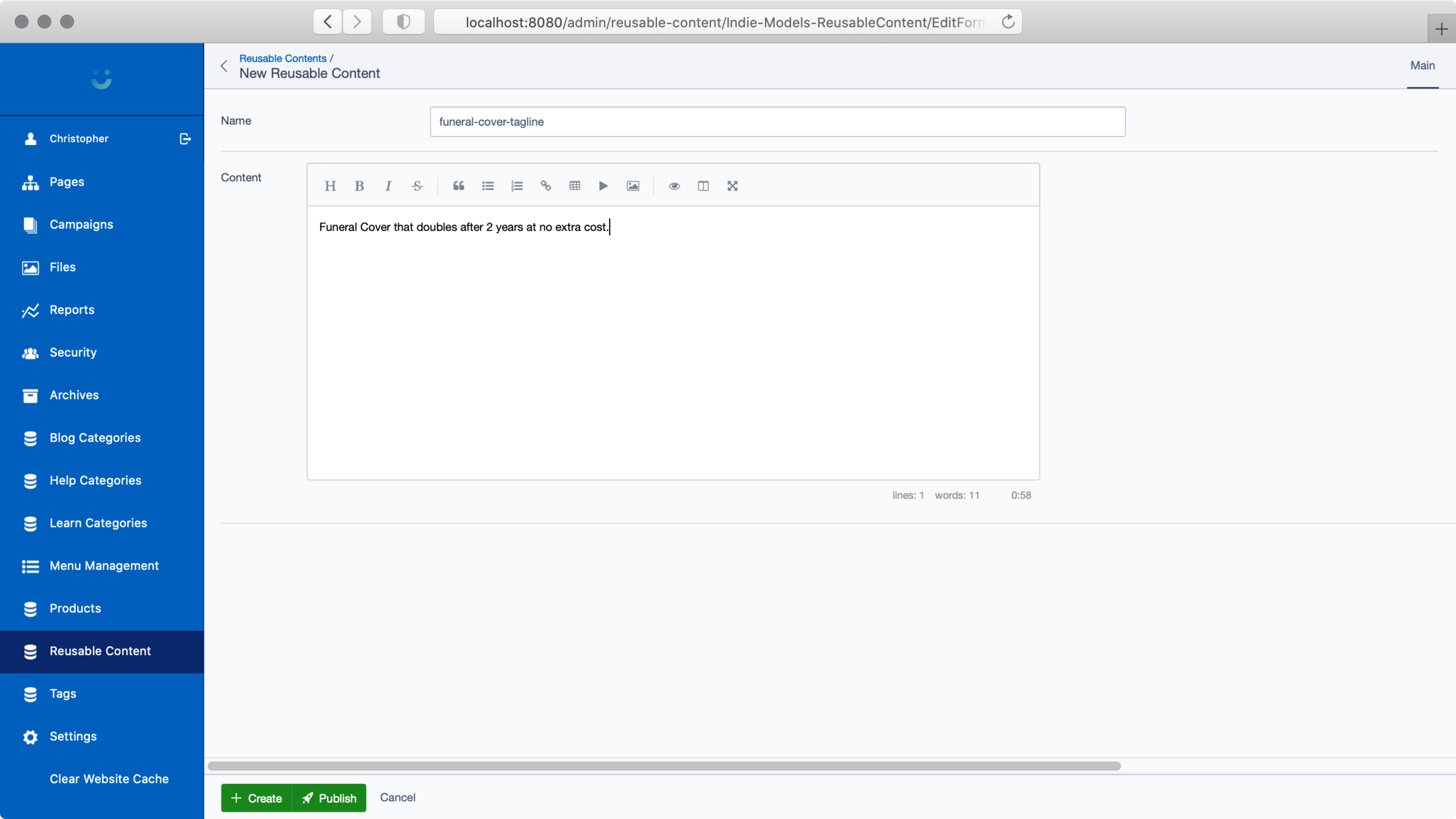
JSON API Controllers
(because no API module is good enough)
probably because we don't understand how they work
import axios from 'axios'
import https from 'https'
const requestCms = axios.create({
baseURL: process.env.HOST_CMS,
headers: { Accept: 'application/json;charset=UTF-8' },
httpsAgent: process.env.HOST_CMS.startsWith('https')
? new https.Agent({ rejectUnauthorized: false })
: undefined,
})Reusable Content Shenanigans
"Let's design us a component!"
<Product
title="Funeral Cover"
description="Funeral Cover that doubles after 2 years at no extra cost."
/>const Product = ({ title, description }) => {
return (
<div className="product-card">
<div className="product-card-title">{title}</div>
<div className="product-card-description">{description}</div>
</div>
)
}
export { Product }"Wait, how do we make it dynamic?"
import { useEffect, useState } from 'react'
const Product = ({ title, description }) => {
const [dynamicTitle, setDynamicTitle] = useState(title)
const [dyanmicDescription, setDynamicDescription] = useState(description)
useEffect(() => {
fetch(`http://localhost:3000/api/reusable?name=${title}`)
.then((response) => response.json())
.then(({ content }) => setDynamicTitle(content))
}, [title])
useEffect(() => {
fetch(`http://localhost:3000/api/reusable?name=${description}`)
.then((response) => response.json())
.then(({ content }) => setDynamicDescription(content))
}, [description])
return (
<div>
<div>{dynamicTitle}</div>
<div>{dyanmicDescription}</div>
</div>
)
}
export { Product }"That's not very scalable..."
return (
<ProductCard>
<ProductCardTitle>
<Reusable name={title} />
</ProductCardTitle>
<ProductCardDescription>
<Reusable name={description} />
</ProductCardDescription>
</ProductCard>
);
import { useEffect, useState } from 'react'
const Reusable = ({ name }) => {
const [content, setContent] = useState(null)
useEffect(() => {
fetch(`http://localhost:3000/api/reusable?name=${name}`)
.then((response) => response.json())
.then(({ content }) => setContent(content))
}, [name])
return content
}
export { Reusable }"What if we want to turn it off and on again?"
import { createContext } from 'react'
const ReusableContext = createContext(undefined)
const DefaultOffReusableContextProvider = ({ children }) => (
<ReusableContext.Provider value={{ isReusable: false }}>
{children}
</ReusableContext.Provider>
)
const DefaultOnReusableContextProvider = ({ children }) => (
<ReusableContext.Provider value={{ isReusable: true }}>
{children}
</ReusableContext.Provider>
)
export {
ReusableContext,
DefaultOffReusableContextProvider,
DefaultOnReusableContextProvider,
}import {
DefaultOffReusableContextProvider,
DefaultOnReusableContextProvider,
} from '../state'
import { Product, Reusable } from '../components'
const HomePage = () => {
return (
<DefaultOffReusableContextProvider>
<Product
title="Testing a new Product"
description="...with a lovely description!"
/>
<DefaultOnReusableContextProvider>
<Product
title="funeral-cover-title"
description="funeral-cover-description"
/>
</DefaultOnReusableContextProvider>
</DefaultOffReusableContextProvider>
)
}
export default HomePageimport { useContext } from 'react'
import { ReusableContext } from '../state'
import { Reusable } from '../components'
const Product = ({ title, description }) => {
const { isReusable } = useContext(ReusableContext)
return (
<ProductCard>
<ProductCardTitle>
{isReusable ? <Reusable name={title} /> : title}
</ProductCardTitle>
<ProductCardDescription>
{isReusable ? <Reusable name={description} /> : description}
</ProductCardDescription>
</ProductCard>
)
}
export { Product }"What if we want to turn it off and on
ON THE SAME COMPONENT?!"
🤔
const valueOf = (value) => {
if (typeof value === 'function') {
return value()
}
if (value.startsWith('reusable:')) {
value = value.replace('reusable:', '')
value = <Reusable name={value} />
}
return value
}import { valueOf as 🐮 } from '../helpers'
const Product = ({ title, description }) => {
return (
<ProductCard>
<ProductCardTitle>{🐮(title)}</ProductCardTitle>
<ProductCardDescription>{🐮(description)}</ProductCardDescription>
</ProductCard>
)
}
export { Product }"All those requests...you maniac!"
import { useEffect, useState } from 'react'
const queued = []
const BatchedReusable = ({ name }) => {
const [content, setContent] = useState(null)
queued.push({ name, setContent })
return content
}
const Fetcher = () => {
useEffect(() => {
fetchReusableContent()
return () => {
// maybe cancel these on unmount...
}
}, [])
return null
}
const fetchReusableContent = () => {
const joined = queued.map((queued) => queued.name).join(',')
fetch(`http://localhost:3000/api/reusable?names=${joined}`)
.then((response) => response.json())
.then((contents) => {
for (let {name, setContent} of queued) {
if (contents[name]) {
setContent(contents[name])
}
}
})
}
export {
BatchedReusable,
Fetcher,
}import { Fetcher } from '../components'
const Layout = ({ children }) => {
return (
<div className="layout">
{children}
<Fetcher />
</div>
)
}
export { Layout }Redux Lite™
- - reducers + actions
- - connect + higher-order components
- - async actions
massive learning curve
- - reducers + actions
- - connect + higher-order components
- - async actions
massive learning curve
- - reducers + actions
- - connect + higher-order components
- - async actions
- + reduce (heh!) the dependencies
massive learning curve
import { useEffect, useReducer } from 'react'
const initial = {
posts: [],
loading: false,
viewing: undefined,
}
const reducer = (state, { type, payload }) => {
if (type === 'load') return {
...state,
loading: true,
}
if (type === 'loaded') return {
...state,
loading: false,
posts: payload,
}
if (type === 'view') return {
...state,
viewing: payload,
}
if (type === 'back') return {
...state,
viewing: undefined,
}
return state
}import { useEffect, useReducer } from 'react'
// ...
const Blog = () => {
const [{ posts, loading, viewing }, dispatch] = useReducer(reducer, initial);
useEffect(() => {
dispatch({ type: 'load' })
fetch('https://localhost:3000/api/posts')
.then((response) => response.json())
.then(({ posts }) => dispatch({ type: 'loaded', payload: posts }))
}, [])
if (loading) {
return 'Loading...'
}
if (viewing) {
return <Post {...viewing} onBack={() => dispatch({ type: 'back' })} />
}
return <Posts posts={posts} onSelect={(post) => dispatch({ type: 'view', payload: post })} />
}"Can we share and mix
reducers and initials?"
import { createContext } from 'react'
import { initial as articlesInitial, reducer as articlesReducer } from './articles'
import { initial as productsInitial, reducer as productsReducer } from './products'
export const initial = {
...articlesInitial,
...productsInitial,
}
export const reducer = (state, action) => {
state = articlesReducer(state, action)
state = productsReducer(state, action)
return state
}
export const context = createContext(undefined)import { context as AppContext, initial, reducer } from '../reducers'
import { Router } from '../screens'
const AppProvider = ({ children }) => {
const [state, dispatch] = useReducer(reducer, initial)
return (
<AppContext.Provider value={[state, dispatch]}>
{children}
</AppContext.Provider>
)
}
const App = () => (
<AppProvider>
<Router />
</AppProvider>
)
export { App }import React, { useEffect, useContext } from 'react'
import { context } from '../reducers'
import { load } from '../reducers/products'
import { Product } from '../components'
const ListProducts = ({ match }) => {
const [{ products }, dispatch] = useContext(context)
useEffect(() => {
dispatch(load())
}, [])
return (
<div>
{products.loading && <div>loading products...</div>}
{products.items.length ? (
<ol>
{products.items.map(product => (
<Product key={product.id} {...product} />
))}
</ol>
) : (
<div>no products</div>
)}
</div>
)
}
export { ListProducts }questions?
Bonus bits
namespace Indie\Models;
use SilverStripe\Blog\Model\Blog;
use SilverStripe\ORM\HiddenClass;
// hide this page type when creating new pages...
class HiddenBlog extends Blog implements HiddenClass
{
// hide the standard blog section page type...
private static $hide_ancestor = Blog::class;
}namespace Indie\Models;
use SilverStripe\Blog\Model\Blog;
class LearnSection extends Blog
{
private static $table_name = 'IndieLearnSection';
private static $allowed_children = [LearnPost::class];
private static $description = 'Adds a learn to your website.';
public function canCreate($member = null, $context = [])
{
// can't be a child of another page...
if (isset($context['Parent'])) {
return false;
}
// only one learn (blog) section at a time...
return !LearnSection::get()->first();
}
}MDX problems
import React from 'react'
import MDX from '@mdx-js/runtime'
const components = {
h1: props => <h1 className="larger-text" {...props} />,
}
const mdx = `
# Welcome, customer!
`
const HomePage = () => (
<MDX components={components}>
{mdx}
</MDX>
)"Please don't use eval"
next-mdx-remote
export async function getStaticPaths() {
const response = requestCms.get('/api/slugs/all/live')
const paths = response.data
const slugs = paths.data.map((url) => ({
params: { slug: url.split('/') }
}))
return { paths: slugs, fallback: true }
}
export async function getStaticProps({ params }) {
const { page } = await getPage({ ...params })
const source = await renderToString(page.content, { components })
return {
props: {
...data,
source,
},
revalidate: 30,
}
}"Please don't build in the pipeline"
😓
export async function getServerSideProps(req) {
const { page } = await getPage({ slug: req.query.slug })
const source = await renderToString(page.content, { components })
return {
props: {
...data,
source,
},
}
}